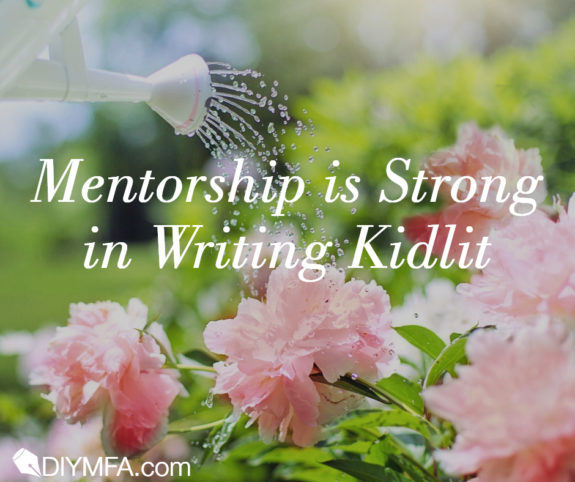Mentoring has become a hot topic in the kidlit community. It seems like every few months a new program to match aspiring authors with established ones is announced. Why the desire for such programs? What are the benefits, and what should you look for in a mentor?
Mentorship can accelerate a writer’s growth and open opportunities. I can personally attest that being selected as a mentee (Author Mentor Match: Round 3) has improved my writing, given me an amazing cohort of fellow mentees to commiserate with, and gave me a great confidence boost!
So what exactly is mentoring?
Literary Mentoring is about Guidance
You may have heard of mentoring in a business context rather than a writing one. Professionals who are higher on the career ladder may reach a hand down to help out someone newer to the industry. When they do this in a consistent, ongoing way, they’re a mentor.
In literary circles, mentorship usually comes in the form of an agented or published author offering industry guidance and/or editorial support to a writer who hasn’t yet reached the publishing milestones they seek. Some mentors & mentees become close friends or long-term critique partners. Some mentorships are short, for the duration of an event or a period of time.
There are no formal guidelines for what a mentor is, or what a mentor is required to do. There’s also no established vetting process for who can call themselves a mentor, so you should always do thorough research before signing up.
How a Mentor Relationship can Help
Every mentor/mentee relationship is unique to the participants. If there’s something you want from a mentor, or want to avoid, it’s best to ask questions and discuss this rather than make assumptions. Remember that mentors are generously donating their time to helping their mentees and are not obligated to do more than was agreed on at the start.
Some things mentors may be willing to help with:
- Talk about the industry and share insider information.
- Provide editorial feedback (this can vary from a general edit letter to line-edits) on anywhere from queries to full manuscripts.
- Advise on where and how to submit your work.
- Guide a mentee in selecting an agent or press.
Organized Kidlit Mentor Programs
Because mentorship can be such a boost to new writers, several organized programs have sprung up to help mentors and mentees find each other. The selection process is, like everything to do with writing, highly subjective.
To ensure both parties get the most out of the partnership, most organized programs have the mentors post a “wish list” where they describe their experience, the type of projects they’d like to work on, and what kind of relationship they’re offering. For instance, a debut author mentor may state that they only want to read historical fiction, and that they’re willing to do in-line comments, but not line-edits.
Hopeful applicants submit according to the program’s rules, which usually require some combination of query, sample pages, and synopsis. Just like submitting to an agent or a publishing house, this is the time to show you can follow directions!
Mentors read all the material submitted to them and make their selections. The program ensures the mentor and mentee are able to get in touch. It’s then up to the mentor and mentee to determine how they’ll work together, taking into account the status of the mentee’s materials.
Some programs are event-driven and provide more structure to the timeline after matching, like an “agent showcase” where mentee work is made available to agents who can request to see more. Other programs are more open-ended.
Associated Benefits of Organized Mentor Programs
Organized mentor programs offer more than just the opportunity to match with a mentor. Odds are that only a small selection of applicants will be matched with a mentor, but you don’t even have to enter (Although you should! Don’t self-reject!) many programs to still reap the benefits.
Many programs want to get people excited to enter, so they offer things like Twitter parties, critique giveaways, support groups for hopefuls, and more. These are all excellent ways to find your writing community! Join the festivities, and don’t be afraid to reach out to fellow hopefuls. Chances are good that you’re a) writing similar genres or age categories depending on the program, and b) at a similar stage in your writing journey.
Lots of writers who weren’t selected for mentorship have still come away with new friends and critique partners. You don’t need a formal mentor program to have a community that supports you.
What to Look for in an Organized Mentor Program
You want to find a program that has a good reputation. Talk to other writers and read old posts about the program to get a feel for it and how its mentors have behaved in the past. If there have been incidents in the past, how did the program handle them? Have previous mentees gone on to have success?
Read the mentor bios and wishlists closely. Do your research on the mentors you think could be a good match. Look for reputation within the kidlit community, and the mentor’s professional credentials. Most programs require an author be agented before they offer assistance to unagented writers. Mentors may also be freelance editors, but agents and publishing house employees can be a red flag.
When looking at online peer-run programs there shouldn’t be any cost to you, the mentee. These are programs run by volunteer organizers, matching volunteer mentors with mentees. If donating is an option make sure that this won’t influence the mentor decisions. On the other hand, there are also programs run by professional organizations, like SCBWI, which may charge for services, especially if you’re selected to attend an event like a retreat. Always weigh the quality of what you’re getting against the cost.
Some Literary Kidlit Mentoring Programs to Look for
Author Mentor Match: Open-ended long-term mentorship, for MG & YA writers. Usually hosts two “rounds” of selections a year.
Pitch Wars: An intensive annual program, where mentors and mentees get a window of a few months to polish a selected manuscript for an agent showcase.
SCBWI Mentorship Programs: Terms differ according to region. Not all regions offer mentorship. SCBWI also offers the Work-in-Progress Awards which puts selected manuscripts in front of editors.
We Need Diverse Books Mentorships: Annual opportunity for diverse writers and illustrators to match with a mentor for approximately one year.
Mentorship is One Path of Many
There are lots of ways to publish, and mentorship is only one of many routes to take. The number of open slots is limited, and selections are subjective. The majority of published authors did not have a formal mentor relationship. While having a mentor can be a big help, it’s also not a guarantee of future success.
It’s important not to take rejection personally, but to instead recognize the important victories: You wrote a book and you were brave enough to ask someone to read it. And if you manage that once you can do it again, and again.

Bronwen Fleetwood writes fiction for young adults, and nonfiction for writers. Bronwen studied creative writing at Eugene Lang,The New School for Liberal Arts, has acted as leader of the Princeton Writing Group, and as a Municipal Liaison for National Novel Writing Month. Bronwen currently lives on the Whale Coast of South Africa, between the mountains, the sea, and a lake. You can connect with her at bronwenfleetwood.com.







